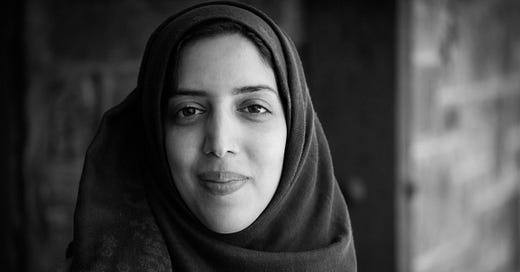Passport privilege: the realities of being a Palestinian travel writer
Lama Obeid got her dream job. But it came at a price...
Lama Obeid is a Palestinian writer and trainer based in Ramallah, Palestine. She writes about travel, gastronomy, politics and culture. She advocates for the Palestinian cause wherever she goes and is a third generation Palestinian refugee displaced from the town of Ein Karem in West Jerusalem. Here she is with a short essay on the realities of being a Palestinian travel writer.
In 2023, I got my debut into the travel writing world: a commission for Lonely Planet’s 11th edition of the Israel and the Palestinian Territories guide. Any other travel writer would have been head over heels for this opportunity, but as a Palestinian travel writer that was travelling abroad at that moment, I was dreading the complications I would have to go through to re-enter Palestine to work on the project; the borders are a story on their own.
Unfortunately, a couple of months later after I got the commission, October 7th happened and war broke out, and so the project was put on hold for safety concerns. Concerns for traveller safety is of course a valid reason, but as a Palestinian, I was never really safe in the first place. Eventually, I got assigned a new project: the sixteenth edition of the Egypt guidebook and the first edition of their new Experience Egypt book. I should have been psyched about something like this, but instead, the burden of travelling abroad as a Palestinian hit me hard.
I can’t fly out of Palestine, so I have to head to Queen Alia Airport in Amman, Jordan, by land first. But it’s not as simple as driving over the border. Crossing between the West Bank and Jordan, at the Al-Karameh border crossing, can sometimes take a whole day – and a whole lot of bureaucracy.
Before travelling, I have to take a personal photo and my Palestinian ID card to a service office to get an exit re-entry permit which costs US$14. After a 45 minute drive to the Palestinian borders – or more depending on the checkpoints and the mood of the Israeli soldiers that day – I am given a number at the gate. I then enter the Palestinian border office in Jericho and pay the exit tax which is about US$45 per person (it’s worth noting that the average income for Palestinians is about US$600 per month, so this is a sizeable fee). I get my payment receipt and move on to the next window to buy bus tickets for myself and my luggage, which usually costs around US$10-15, plus tips for the border staff who load the bags into the bus – without a tip, my luggage goes nowhere.
In the next hall, when my number is called I go to the Palestinian border officer, but not without my documents: exit re-entry permit, Jordanian passport (all Palestinians that were refugees in Jordan after 1948 war were granted Jordanian citizenship and my family was one of them while living in ِِAl-Karameh Refugee camp), Palestinian ID, Jordanian bridge card (a permit for all Palestinians with Jordanian passports to cross the King Hussein Bridge), and the exit tax receipt. That’s border check number one complete. Now I board the bus and drive to the Israeli border control.
On arrival we are greeted by rifle-wielding soldiers as we go through metal detectors to finally meet the Israeli border police. I present my Palestinian ID, exit re-entry permit, tax slip, and upon their request/mood, sometimes my passport. That’s border control check number two.
Finally, I head to the Jordanian borders. There’s more form filling here: an arrivals document that everyone must complete by hand, and inevitably I’m the only person with a pen so I wait while everyone shares mine. I get a pat down from a female security guard, line up at the windows and then present another wad of documents to the Jordanian border officers: Jordanian passport, bridge card, the exit re-entry permit, and arrivals form. As long as they decide not to stall my entry for their own entertainment, I am almost through.
I then take my stamped arrivals card, give it to another officer, look for my bag in a room full of luggage, then put my bags onto a belt to be scanned and pray I do not get summoned for a search. I have to pay one Jordanian Dinar ($1.41 US) for each piece of luggage (because why leave any money with a travelling Palestinian?), and find my cab to the airport.
It is only here, where I can finally put away all the extra paperwork and pluck out my passport, that I get to pretend I am a normal travel writer. At the airport, the world is supposed to be your oyster, but it’s not mine. I only get a short reprieve until I return home and the next commission comes in, then I get to do the expensive and complicated border dance all over again.
This is the fourth post in our series on race and racism in travel writing. If you’ve found this series enlightening, support our newsletter by subscribing today for just £7 a month. Paid subscribers get access to our entire archive of editor interviews, tips and insights, as well as weekly newsletters that promise to help your career grow.
Don’t forget to check out the back catalogue of Travel Writing Webinars by Meera Dattani for extra tips about pitching, networking, and writing award-worthy features.






Thanks Lama for sharing this. It's important to remember that the easiness with which great part of the Western world travels is not allowed to many other people.
Thank you Lana for sharing your experiences - I feel speechless. I wish you all the success in your commission and travel writing career, and very much look forward to reading your words 🥰